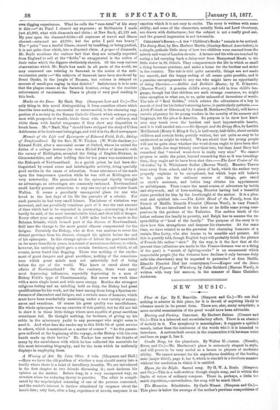Memoir of the Life and Episcopate of Edward Feild, D.D.,
Bishop of Newfoundland. By the Rev. H. W. Tucker. (W. Wells Gardner.)— Edward Feild, after a successful career at Oxford, where he united the duties of a college lecturer (he was a Michel Fellow of Queen's) with the curaoy of Kidlington, accepted the living of English-Bicknor, in Gloucestershire, and after holding this for ten years was nominated to the Bishopric of Newfoundland. As a parish priest he had been dis- tinguished by sound sense and indefatigable activity, doing specially good service in the cause of education. Some utterances of his made upon the temperance question while he was still at Kidlington are very noteworthy. His promotion to the episcopal dignity brought no advantage, as advantages are commonly reckoned. Newfoundland could hardly present attractions to any one except a salt-water Izaak Walton. It seems a peculiarly uncongenial place for one who loved to the last days of his life the pursuits of a scholar. For such pursuits he had very small leisure. The labour of visitation was incessant, and one peculiarly vexatious part of it was the vast amount of time which had to be expended in journeying,—journeying, it need hardly be said, of the most uncomfortable kind, and often full of danger. Every other year an expedition of 1,300 miles had to be made to the Bahama Islands, which formed part of the diocese of Newfoundland. Still here the change to the more genial climate compensated for the fatigue. Certainly the Bishop, who at first was anxious to sever the distant province from his diocese, changed his opinion before the and of his episcopate. In this strange sphere of labour the good man toiled on for more than thirty years, in a round of monotonous labour, to which, however, his untiring spirit gave a certain freshness, and which, at all events, never found him flagging. There was nothing of the excite- ment of great dangers and great sacrifices, nothing of the conscious- ness which great minds may not unlawfully feel of being before the eye of the world. Who knew or cared about the affairs of Newfoundland ? On the contrary, there were many most depressing influences, especially depressing to a man of Bishop Feild's type of Chnrchmanship. But never was work done with a more single heart and with more energy. Besides the strongest religious feeling and an unfailing hold on duty, the Bishop had great qualifications for his work, not the least among them being a Spartan en- durance of discomfort and fatigue, and a certain sense of humour, which must have been wonderfully sustaining under a vast variety of annoy- ances and vexations. Of course his great quality was unselfishness. His whole episcopate was an exercise of this quality, but he did not fail to show it in those little things where men capable of great sacrifices sometimes fail. He thought nothing, for instance, of giving up his cabin in the missionary yacht to any passenger who might seem to need it. And what does the reader say to this little bit of quiet service to others, which is mentioned as a matter of course ? "As the passen- gers suffered at the beginning of the voyage, so the Bishop with his own hands made up their berths." Mr. Tucker has earned the thanks of many by the carefulness with which he has collected the materials for this most interesting biography, and for the taste which he uniformly displays in employing them.






































 Previous page
Previous page